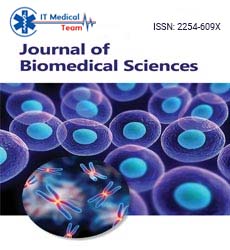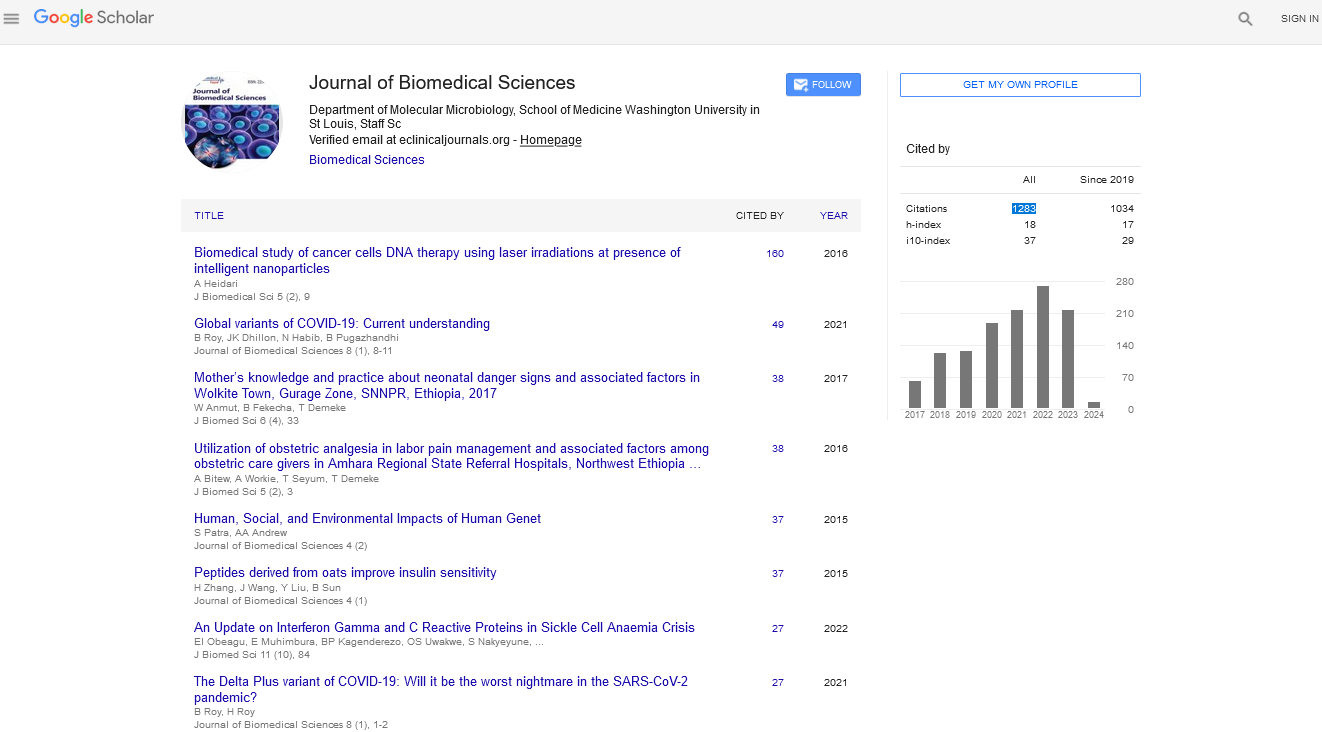Commentary - (2024) Volume 13, Issue 1
Navigating the World of Pharmacology: Understanding the Science of Drugs
Sean Mrozek*
Department of Pharmacology, University of Arizona, Tucson, United Kingdom
*Correspondence:
Sean Mrozek, Department of Pharmacology, University of Arizona, Tucson,
United Kingdom,
Email:
Received: 08-Jan-2024, Manuscript No. IPJBS-24-14482;
Editor assigned: 10-Jan-2024, Pre QC No. IPJBS-24-14482 (PQ);
Reviewed: 24-Jan-2024, QC No. IPJBS-24-14482;
Revised: 30-Jan-2024, Manuscript No. IPJBS-24-14482 (R);
Published:
09-Feb-2024
Description
Pharmacology, the science of drugs, occupies a crucial space at the intersection of biology and medicine. It delves into the study of how substances interact with living organisms, aiming to understand the mechanisms, effects, and applications of drugs. This article provides a comprehensive exploration of pharmacology, covering its historical roots, key principles, and contemporary significance in the field of healthcare.
Historical evolution of pharmacology
The roots of pharmacology can be traced back to ancient civilizations where herbal remedies and natural substances were used for medicinal purposes. Early healers and physicians observed the effects of plants and extracts on the human body, laying the foundation for the understanding of pharmacological principles.
In the middle ages, the compilation of pharmacopeias and the categorization of substances became more structured. However, it was during the Renaissance that the study of pharmacology took a leap forward, with the emergence of the first pharmacological texts and the systematic exploration of the effects of various compounds.
The 19th century witnessed significant advancements in pharmacology, including the isolation of active compounds from plants and the development of synthetic drugs. The establishment of pharmacological laboratories and the recognition of pharmacology as a distinct scientific discipline marked a transformative period, setting the stage for modern pharmacological research.
Key principles of pharmacology
Drug absorption, distribution, and metabolism: Pharmacokinetics, a fundamental aspect of pharmacology, explores how drugs are absorbed, distributed, metabolized, and eliminated by the body. Understanding these processes is crucial for determining the optimal dosage and frequency of drug administration.
Drug-receptor interactions: Drugs exert their effects by interacting with specific receptors in the body. Pharmacodynamics focuses on studying these interactions, elucidating how drugs modulate cellular and physiological functions. The concept of affinity and efficacy guides the understanding of drug-receptor binding and the resulting biological responses.
Drug classes and therapeutic categories: Pharmacology categorizes drugs into various classes based on their mechanisms of action, therapeutic effects, and chemical structures. This classification system helps healthcare professionals make informed decisions about drug selection, combining medications, and predicting potential interactions.
Toxicology: Toxicology is a branch of pharmacology that investigates the adverse effects of drugs and other substances on living organisms. It plays a vital role in assessing the safety of medications, identifying potential risks, and establishing safe dosage ranges.
Pharmacogenetics: Pharmacogenetics explores the influence of genetic variations on an individual's response to drugs. This field recognizes that genetic factors can impact drug metabolism and efficacy, paving the way for personalized medicine approaches tailored to an individual's genetic profile.
Contemporary significance in healthcare
Drug development and discovery: Pharmacology is instrumental in the development and discovery of new drugs. The process involves identifying potential therapeutic targets, screening compounds for activity, and optimizing lead compounds through medicinal chemistry. This multidisciplinary approach contributes to the continuous expansion of the pharmacological toolkit.
Clinical pharmacology: Clinical pharmacology applies pharmacological principles to patient care. It involves optimizing drug regimens, considering individual patient characteristics, and monitoring therapeutic responses. Clinical pharmacologists collaborate with healthcare teams to ensure safe and effective drug use.
Precision medicine: The emergence of precision medicine, guided by pharmacogenetic insights, aims to tailor medical treatments to an individual's unique genetic makeup. Understanding how genetic variations influence drug responses allows for personalized and optimized therapeutic interventions.
Pharmacovigilance: Pharmacovigilance involves monitoring and assessing the safety of drugs once they are on the market. It relies on the collection and analysis of adverse drug reactions, ensuring that potential risks are identified and communicated to healthcare providers and the public.
Pharmacoepidemiology: Pharmacoepidemiology examines the use and effects of drugs in large populations. By analyzing real-world data, researchers can identify patterns, trends, and potential safety concerns, contributing to evidence-based decision-making in healthcare.
Challenges and future directions
Antimicrobial resistance: The rise of antimicrobial resistance poses a significant challenge in pharmacology. The overuse and misuse of antibiotics contribute to the development of resistant strains of bacteria, necessitating ongoing research and global efforts to address this critical issue.
Drug accessibility and affordability: Ensuring equitable access to essential medications remains a global challenge. Addressing issues of drug affordability, particularly for life-saving treatments, requires collaborative efforts from governments, pharmaceutical companies, and international organizations.
Emerging technologies: The integration of technologies such as artificial intelligence and big data analytics is transforming pharmacological research. Advanced computational methods accelerate drug discovery, predict potential drug interactions, and contribute to the development of innovative therapeutic approaches.
Ethical considerations: Ethical considerations in pharmacology involve balancing the benefits and risks of drug development, ensuring informed consent in clinical trials, and addressing potential conflicts of interest. Upholding ethical standards is crucial for maintaining public trust in the pharmaceutical industry and healthcare system.
Pharmacology, as the science of drugs, continues to play a pivotal role in shaping the landscape of healthcare and medicine. From ancient herbal remedies to cutting-edge precision medicine, the field has evolved into a dynamic and multidisciplinary science.
As we navigate the complexities of drug development, patient care, and the challenges posed by emerging health threats, pharmacology remains at the forefront of scientific inquiry. Through continuous research, ethical considerations, and technological innovations, pharmacology contributes to advancing our understanding of drugs and their impact on human health, paving the way for a future where safer, more effective treatments are accessible to all.
Citation: Mrozek S (2024) Navigating the World of Pharmacology: Understanding the Science of Drugs. J Biomed Sci Vol:13 No:1





